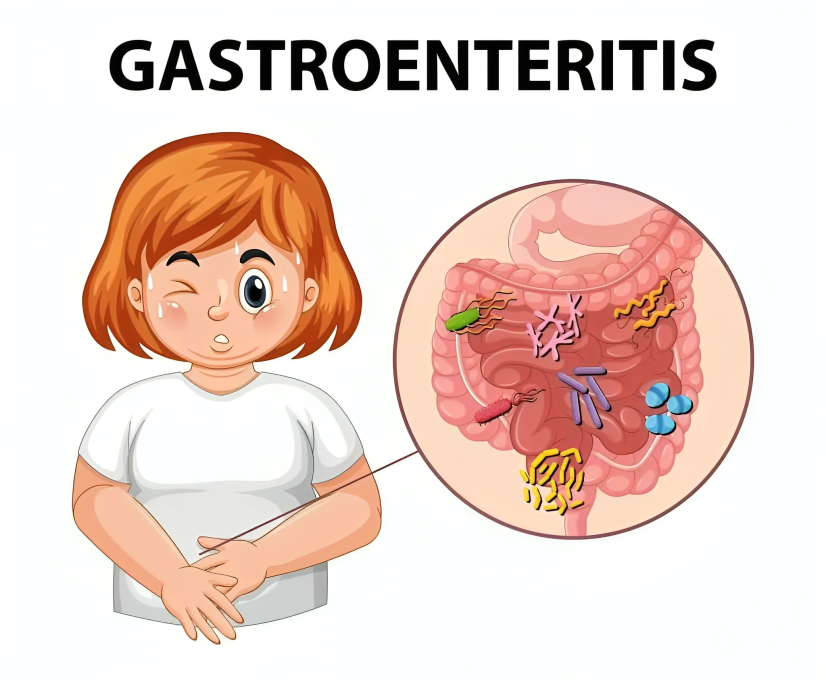Gastroenteritis, often referred to as stomach flu, is an inflammation of the stomach and intestines typically caused by viral or bacterial infections. It can affect people of all ages and is characterized by a variety of symptoms, including diarrhea, vomiting, abdominal pain, and fever. Knowing the key signs of gastroenteritis is essential to recognizing the illness early and seeking timely treatment to prevent complications.
If you are experiencing symptoms associated with gastroenteritis, or if you suspect you may have contracted this infection, it is important to understand the warning signs to take appropriate action. In this article, we will explore the key signs of gastroenteritis, provide useful insights on the condition, and offer recommendations on managing it effectively.
What Is Gastroenteritis?
Before diving into the key signs, it’s important to understand what gastroenteritis is. Gastroenteritis is an infection of the digestive system, primarily the stomach and intestines. It is most commonly caused by viral infections, such as the norovirus, rotavirus, or adenovirus, but it can also result from bacterial infections like Salmonella, E. coli, or Campylobacter. Other causes may include parasites or the overuse of antibiotics, which disrupt the natural balance of bacteria in the gut.
The condition often results in symptoms such as nausea, vomiting, diarrhea, cramping, and fever. Gastroenteritis is usually self-limiting, meaning it resolves on its own in most cases. However, in severe cases, particularly among vulnerable populations such as young children, the elderly, and those with weakened immune systems, complications can arise that require medical intervention.

Key Signs of Gastroenteritis
The key signs of gastroenteritis can vary depending on the cause and severity of the infection. Generally, the most common symptoms include:
1. Diarrhea
Diarrhea is one of the hallmark signs of gastroenteritis. It can range from mild to severe and is often accompanied by frequent bowel movements. The diarrhea may be watery or sometimes contain blood or mucus, depending on the type of infection. In viral gastroenteritis, diarrhea is typically watery and non-bloody, while bacterial infections can cause bloody diarrhea, which is a more serious symptom.
In many cases, diarrhea will last for a few days and gradually improve as the body clears the infection. However, it can lead to dehydration, especially if it is prolonged or accompanied by vomiting.
2. Vomiting
Vomiting is another key sign of gastroenteritis, particularly in the early stages. It often begins suddenly and can be intense, making it difficult to keep food or liquids down. Vomiting typically accompanies nausea and may occur multiple times a day, contributing to dehydration if fluids are not replaced.
In viral gastroenteritis, vomiting usually resolves within a few days, but bacterial infections may cause more prolonged symptoms that require medical intervention.
3. Abdominal Pain and Cramps
Abdominal pain and cramping are common symptoms of gastroenteritis and can vary in intensity. These pains are often described as sharp or cramp-like and may come and go in waves. The pain is typically caused by the inflammation of the stomach and intestines, leading to discomfort and bloating.
Cramping is often associated with the body’s attempt to expel the infection from the digestive system. This pain can be alleviated with rest and by following a proper hydration routine to maintain electrolyte balance.
4. Fever
A fever is another key sign of gastroenteritis and often signals the body’s immune response to the infection. It is common for people with gastroenteritis to experience a mild fever, typically between 100°F and 102°F (37.8°C to 38.8°C). In more severe bacterial infections, the fever may be higher.
Fever is often accompanied by chills and general body aches. It can last for several days, especially if the infection is bacterial. Over-the-counter fever-reducing medications such as acetaminophen or ibuprofen may help to manage this symptom.
5. Dehydration
Dehydration is a serious concern for those with gastroenteritis, particularly in young children, the elderly, or individuals with weakened immune systems. When vomiting and diarrhea are frequent, the body loses essential fluids and electrolytes, which can quickly lead to dehydration.
Signs of dehydration include dry mouth, excessive thirst, dark urine, dizziness, and a reduced frequency of urination. In severe cases, dehydration can lead to more serious complications, such as kidney failure or shock, and may require hospitalization to rehydrate the body through intravenous fluids.
6. Fatigue and Weakness
Fatigue and weakness are often felt as the body fights off the infection. Individuals with gastroenteritis may feel exhausted due to the body’s increased energy expenditure while attempting to fight the infection, in addition to the loss of fluids. This fatigue can make it difficult to carry out daily tasks and may last for a few days even after other symptoms have subsided.
7. Loss of Appetite
People with gastroenteritis often experience a significant loss of appetite. Nausea and vomiting can cause individuals to avoid eating, and even the thought of food may be unappealing. It is important to continue hydrating even if appetite is lost, as fluids are essential for recovery.
How Long Does Gastroenteritis Last?

In most cases, gastroenteritis resolves on its own within a few days to a week. The duration depends on the cause of the infection and the individual’s health. Viral infections, such as those caused by norovirus, may resolve within 1 to 3 days, while bacterial infections may last longer and require treatment with antibiotics.
If symptoms persist for more than a week or worsen over time, it is essential to seek medical attention. Additionally, if there are signs of dehydration, bloody diarrhea, or high fever, immediate medical care is necessary.
When to Seek Medical Help
While most cases of gastroenteritis are mild and self-limiting, there are certain situations where medical help should be sought. These include:
- Persistent or worsening symptoms: If vomiting or diarrhea persists for more than a few days or gets worse, it’s important to consult a healthcare provider.
- Signs of dehydration: Dehydration can be life-threatening, especially in vulnerable groups. Seek medical attention if you or someone you care for shows signs of dehydration.
- Blood in stool or vomit: Bloody stools or vomit can indicate a more serious bacterial infection or injury to the digestive system.
- High fever: A fever higher than 102°F (38.8°C) or one that lasts for several days should be evaluated by a doctor.
Preventing Gastroenteritis
The best way to avoid gastroenteritis is to practice good hygiene and food safety. Some key prevention methods include:
- Washing hands: Thoroughly wash your hands with soap and water after using the bathroom, before eating, and after handling food.
- Proper food handling: Cook food thoroughly and avoid consuming undercooked meats, eggs, or seafood. Clean fruits and vegetables before eating.
- Avoid contact with infected individuals: If someone in your household is sick with gastroenteritis, avoid sharing utensils, towels, or bedding with them.
Additionally, vaccinations are available for certain types of viral gastroenteritis, such as the rotavirus vaccine for children. These vaccines can reduce the risk of severe illness and hospitalization due to gastroenteritis.
Conclusion
Gastroenteritis is a common condition that can cause a range of uncomfortable symptoms, including diarrhea, vomiting, abdominal cramps, fever, and dehydration. Understanding the key signs of gastroenteritis can help you identify the condition early and seek the appropriate care. In most cases, the infection will resolve on its own within a few days, but it’s important to stay hydrated and monitor for signs of complications.
If symptoms persist, worsen, or if dehydration sets in, it is crucial to seek medical attention promptly. By taking precautions and knowing when to seek help, you can manage gastroenteritis effectively and recover more quickly.

wellhealthorganic.com : key signs of gastroenteritis Watch Video


















